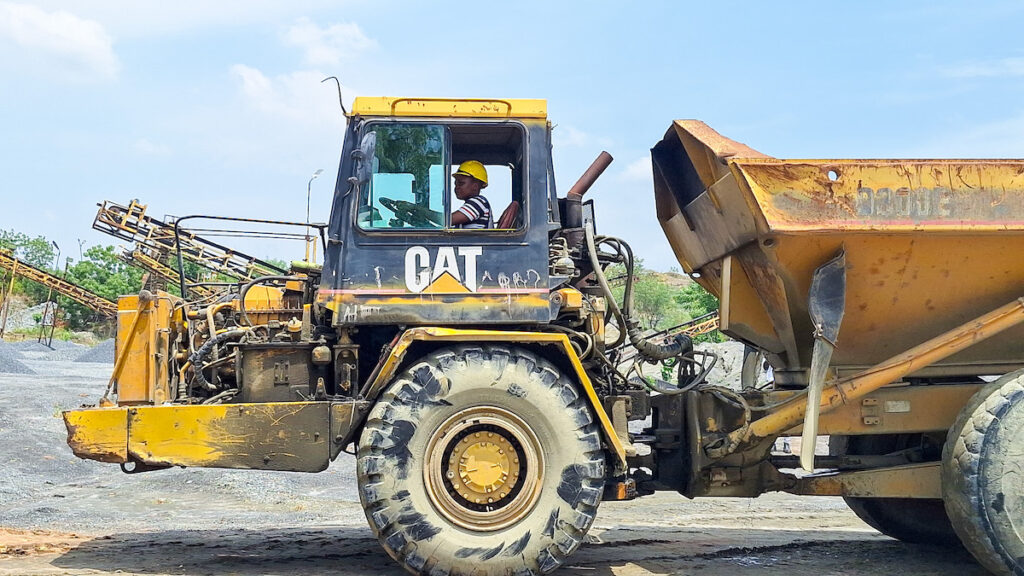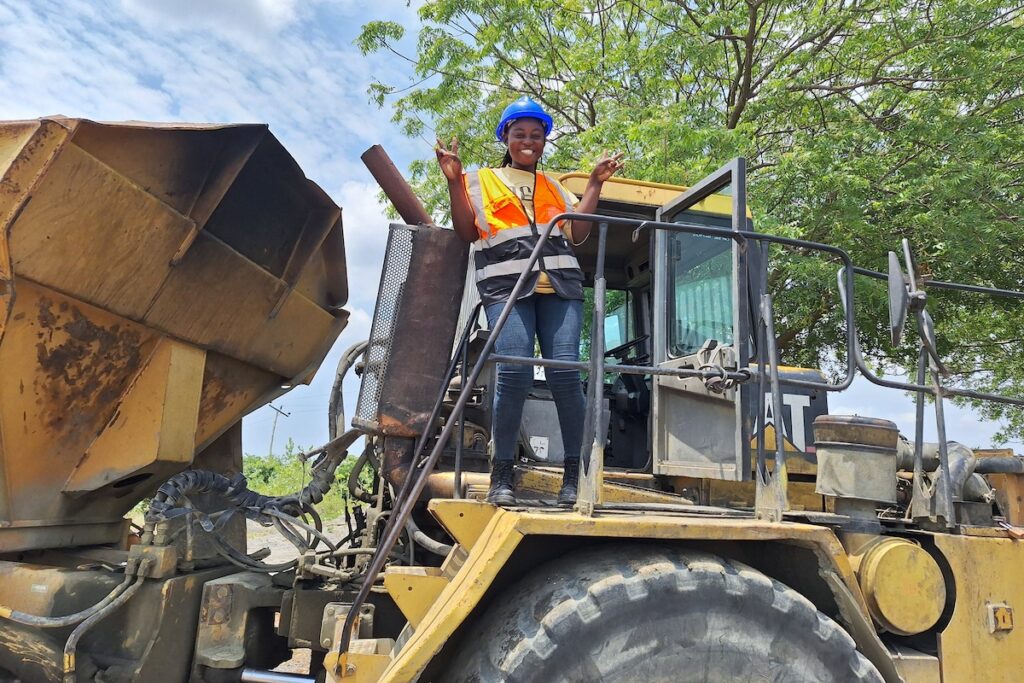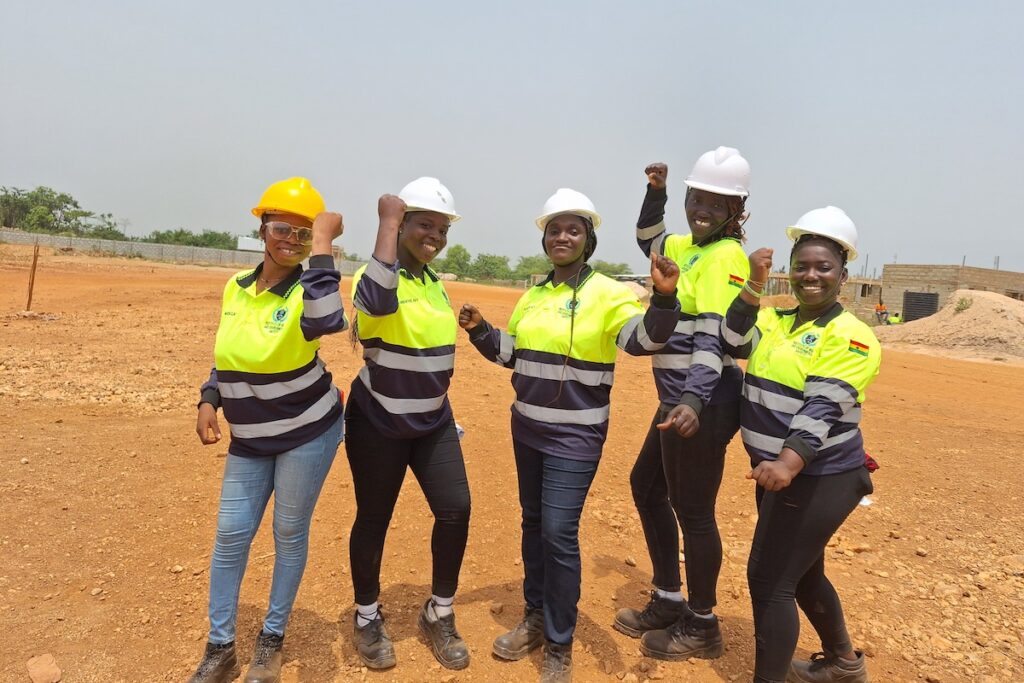In Ghana, training participant Clara Asantewaa Arthur feels proud of her success and confident about her future.
For years, men have dominated higher-paying roles in Ghana’s artisanal and small-scale mining sector (ASM). Jobs like operating excavators or managing administrative duties, have traditionally been reserved for men. Women, who make up less than 10% of the workforce in licensed small-scale mining companies, have been limited to lower-paying roles such as cleaning and support services.
Limited access to technical training, especially on how to operate heavy-duty machinery, has kept many women from advancing.
The Technical Skills for Remunerative Jobs in the ASM Sector project, funded by Kering, is working to shift this narrative. The project equips young women in mining communities with practical skills and technical knowledge so that they are able to access better-paying jobs and build long-term careers in the mining industry.

Technical skills that build confidence
As part of the project, 18 young women from mining communities in the Western and Western North regions of Ghana enrolled at the Institute of Mines & Environmental Safety and the Professional College of Mine and Safety (PCMS).
In partnership with these institutions, Solidaridad supported the women through hands-on training in operating heavy-duty machinery, including dump trucks and excavators. Additionally, the curriculum covered occupational health and safety practices and key skills for work in mining environments.
“We are impressed with the performance of the women. Their dedication and skill prove that with the right training, they can excel in roles traditionally dominated by men,” said Richard Borkey, Administrator at the Institute of Mines and Environmental Safety.
Driving forward: stories of courage and skill
Mabel Oteng, a young unemployed mother from Nkatieso, a community in the Western North region, experienced a shift in her mindset when she joined the project.
“I used to think machines, like mining dump trucks, were only meant for men,” Mabel says.
“Now, operating heavy-duty machines is no longer out of my reach. I can now confidently operate the dump truck!”
Clara Asantewaa Arthur, a Senior High School graduate with limited job prospects, was encouraged by her mother, a member of a Village Savings and Loans Association supported by the project, to join the training programme.
“I had no idea how to even move a saloon car, let alone a truck,” she recalls. “I now operate a dump truck like a pro.”

The project is not only unlocking the untapped potential of young women, but has even helped some, like 22-year-old Nora Ankomah from Tarkwa, achieve their life goals.
“Growing up, I always dreamed of driving heavy-duty trucks like dump trucks. This project gave me the perfect opportunity by equipping me with the knowledge and skills to pursue my dream job,” she says.
Nora looks forward to putting her newly acquired skills into practice in the workplace.
Beyond skills: tackling social challenges
In addition to the heavy machinery training, the project addresses broader social issues that affect young women in mining communities, such as early pregnancy and youth involvement in crime.
“As a young person, having this opportunity gives me hope for a better future. When we are equipped with the right skills and support, we are less likely to engage in crime or become pregnant at an early age. This kind of initiative can truly change the story for young people in our communities,” says Ivy Nyamekye, a participant in the training programme.
A future full of possibilities
Once training is complete, the women will have the opportunity to work with project partners who are licensed artisanal and small-scale mining companies in their regions.
Through vocational training and access to capital through the Village Savings and Loans Associations (VSLAs) scheme, the initiative is also creating pathways for income generation for women in mining communities. With this support, the women are able to invest in education and new businesses, while gaining financial independence to support their families.

About the Kering Technical Skills for Remunerative Jobs project
Funded by global fashion house Kering, the Technical Skills for Remunerative Jobs in the ASM Sector project develops sustainable economic opportunities for women in mining communities in Ghana. The initiative addresses skill gaps, financial exclusion, and gender disparities to help build a more inclusive mining sector.
“Through these interventions, we aim to create sustainable pathways for women to thrive, ensuring they are not only participants but leaders in their communities,” says Ransford Barnie, Programme Officer for Responsible Gold at Solidaridad.
“We look forward to building new partnerships that will help empower even more women in mining communities. We believe that by working together with like-minded organisations, we can expand our impact and create lasting change.”

